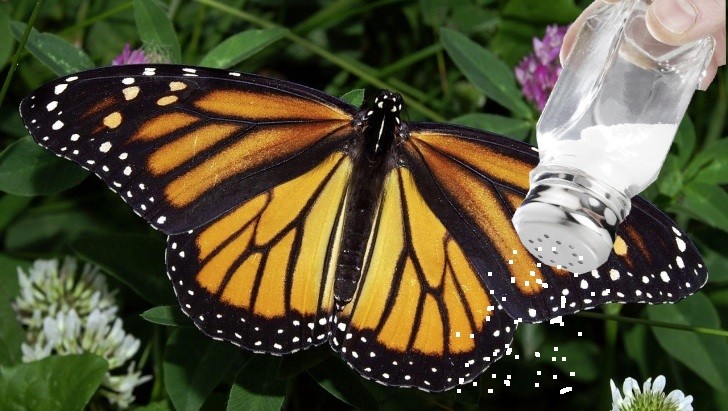Winter chill and heavy snow are long gone now, being replaced by sun, plants and butterflies. Speaking of these funky colored creatures, if you don't see as many of them as last year, some studies say it’s because of all that salt used last winter to defrost the roads.
Sprinkling sodium chloride, which is also the cheapest salt available, on snowy roads is the most common method of de-icing them. It’s natural and effective, but it harms both metal structures and wildlife.
We all know salt will boost metal corrosion and earlier studies shown it doesn’t do much good to plants and aquatic life forms when the snow melts along with the salt, forming a saline solution that infiltrates into the ground. Another study recently reported on AFP shows that using a lot of salt on the roads during winter also shortens the life of butterflies.
Published in the Proceedings of the National Academy of Science by lead author and biologist Emilie Snell-Rood, the study focuses in particular on the monarch butterfly, a migratory species that feeds on the milkweed plants growing along the roadside and open prairies.
The science team discovered that roadside milkweed plants contain 30 times more sodium than normal in their tissue, with the excess coming from... you guessed - salt using to melt the snow.
When butterflies eat the plant’s leaves, their sodium levels grow too. In small amounts, sodium will make fly-muscles grow bigger on males, while females will get a bigger brain.
Butterflies with bigger muscles and brains might be more suited for their German translation “Schmetterling”, but the study also shows that bigger doses are lethal. For example, monarch caterpillars (the undeveloped mature butterfly) has around 20 percent less chances of survival feeding with the roadside plants than with those in the open fields.
Why should you care? Plants rely on insects like bees and butterflies to reproduce, because they get to transport the pollen from one flower to another, process knows as pollination. Whole colonies of honey bees are now dying all over the world because the pesticides used on fields. And now, butterflies are starting to die younger, which means that at one point, when these insects will disappear, around 80 percent of the plants are said to extinct.
It’s a long way to reach that point, but still, we should take care of these small things too, if all the auto industry is now about green ways of transportation.
We all know salt will boost metal corrosion and earlier studies shown it doesn’t do much good to plants and aquatic life forms when the snow melts along with the salt, forming a saline solution that infiltrates into the ground. Another study recently reported on AFP shows that using a lot of salt on the roads during winter also shortens the life of butterflies.
Published in the Proceedings of the National Academy of Science by lead author and biologist Emilie Snell-Rood, the study focuses in particular on the monarch butterfly, a migratory species that feeds on the milkweed plants growing along the roadside and open prairies.
The science team discovered that roadside milkweed plants contain 30 times more sodium than normal in their tissue, with the excess coming from... you guessed - salt using to melt the snow.
When butterflies eat the plant’s leaves, their sodium levels grow too. In small amounts, sodium will make fly-muscles grow bigger on males, while females will get a bigger brain.
Butterflies with bigger muscles and brains might be more suited for their German translation “Schmetterling”, but the study also shows that bigger doses are lethal. For example, monarch caterpillars (the undeveloped mature butterfly) has around 20 percent less chances of survival feeding with the roadside plants than with those in the open fields.
Why should you care? Plants rely on insects like bees and butterflies to reproduce, because they get to transport the pollen from one flower to another, process knows as pollination. Whole colonies of honey bees are now dying all over the world because the pesticides used on fields. And now, butterflies are starting to die younger, which means that at one point, when these insects will disappear, around 80 percent of the plants are said to extinct.
It’s a long way to reach that point, but still, we should take care of these small things too, if all the auto industry is now about green ways of transportation.
